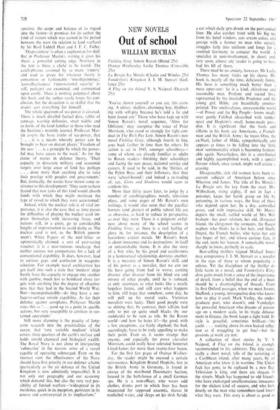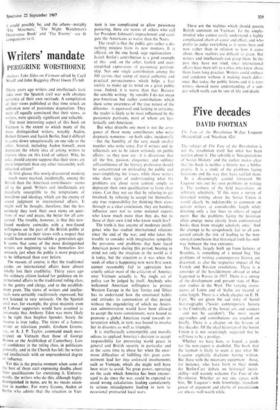NEW NOVELS
Out of school
WILLIAM BUCHAN
Fielding Gray Simon Raven (Blond 25s) Orange Wednesday Leslie Thomas (Constable 25s) La Borgia Ira Morris (Chatto and Windus 25s) Vanderlyn's Kingdom J. I. M. Stewart (Gol- lancz 25s) A Flag on the Island V. S. Naipaul (Deutsch 25s) 'You've shown yourself as you are, this even- ing. A clever, shallow, charming boy, blubber- ing with self-pity because he's told a lie and been found out.' Those who have kept up with Simon Raven's novel sequence, 'Alms for Oblivion,' may recognise the voice of Peter Morrison, who stood so strongly for right con- duct in The Rich Pay Late. Simon Raven's new novel Fielding Gray, although fourth in line, goes back farther in time than the others. Its action is set in 1945, amongst schoolboys— some of whom are already familiar as adults to Raven readers—finishing their schooldays and facing the new peace, national service and careers. It used to be said, in the 'thirties, of the Pylon Boys and their followers, that they were `school-bound'; and indeed a re-reading of, say, Lions and Shadows would seem to confirm this.
More than thirty years later, to judge by a number of autobiographies, novels, television plays, and some pages of Mr Raven's own writings, it would also seem that the peculiar horrors (and glories) of public school life are as obsessive, as hard to reduce in perspective, as ever they were. There is a poignant awful- ness about many of the school scenes in Fielding Gray, as there is a real feeling of glory in, for instance, the description of a hazardous cricket match. Mr Raven's book is about innocence and its destruction: in itself an untarnishable theme. It is also the story of a boy who, by his greed and carelessness in a homosexual relationship, destroys another. It is a measure of Simon Raven's skill, and of his power as a moralist, that we can see his hero going from bad to worse, earning disaster after disaster from his blind use and misuse of other people, until he is reduced, at only seventeen, to what looks like a nearly hopeless future, and still care what happens to him, still hope that somehow, some day, he will pull up his moral socks. Victorian moralists were lucky. Their good people were so shining that, by contrast, their villains had only to put up quite small blacks (by our standards) to be seen as vile. In the Raven world—and how he hates in—the good, with a few exceptions, are fairly slipshod; the bad, accordingly, have to be truly appalling to make their point. Even so, it seems strange that anyone, and especially the preux chevalier Morrison, could really have tolerated Somerset Lloyd-James for more than twenty-four hours.
For the first few pages of Orange Wednes- day, the -reader might be excused a certain nervousness. Kingdom Brunel Hopkins, lost to the British Army in Germany, is found in charge of the moribund Documents Section, housed in the bath-house of a small German spa. He is a non-officer, who wears odd clothes, drinks port in which liver has been macerated for supposed anaemia, shaves in medicinal water, and sleeps on his desk beside
a cat which daily gets drunk on the port-soaked liver. He also catches trout with his big toe from his hotel window, eats cream cakes, and gossips with a former ss man who secretly struggles fatly into uniform and longs for a reunited Germany to conquer the world. A specialist in non-involvement, in short; and, very soon, almost any reader is going to have had his fill of those.
There need be no anxiety, however, Mr Leslie Thomas has many tricks up his sleeve. His book is, nearly all the time, deliciously funny. His hero is something much better than a mere opter-out: he is a kind, chivalrous and reasonable man. Profane and sacred love, represented by the insatiable Prudence and the young girl, Hilde, are beautifully counter- pointed. The unchivalrous, unreasonable world —of Power and the Big People—looms madly over gentle Fulsbad (described with tender- ness) and Hopkins's small, home-made para- dise. It is significant that the fools and villains in his book are Americans, a French- man and the British Army; he treats Otto, the ex-Nazi, father of Hilde, sympathetically and appears at times to be falling into the 'little man' sentimentality which is becoming fashion- able again. Nevertheless, this is a sure-footed and highly accomplished work, with a special flavour which, once tasted, might well create a craving.
Disagreeable, rich old women have been re- current subjects of American fiction since Wharton and James. The title of Ira Morris's La Borgia sets the key from the start Mrs Wilbraham, rising eighty, if not in fact a poisoner, keeps her harsh grasp on life by poisoning, in various ways, the lives of those who depend upon her. In a dry, controlled prose, and with impressive skill, Mr Morris depicts the small, rattled world of Mrs Wil- braham—her poor relation, her old, ill-treated friend, the clergymen she torments, the flaccid nephew who thinks he is her heir, and finally Dupre, the French butler, who hates her and has hopes of her, and whose curious fate, in the end, turns her human. A remarkable novel, sharply in focus, perfectly in scale.
Best-selling thrillers (signed Michael Innes) may compromise J. I. M. Stewart as a novelist in the eyes of those to whom popularity is odious. Yet the disciplines of the thriller do little harm in a novel, and Vanderlyn's King- dom gains much from a sense of the importance of detail, from a belief that the end of a book should be a disentangling of threads. From its first Oxford passages, when we meet Jerern Shefford, a young, introspective don who knows how to play it cool; Mark Varley, the under- graduate poet, who doesn't; and Vanderlyn. the powerful American who dreams of patron- age on a modern scale, to its tragic dénoue- ment in Greece, the book keeps a tight hold. Its style is graceful, sometimes brilliant—`the yacht . . . rocking above its own locked reflec- tion as if struggling to get free'—but the passions at work are not.
A collection of short stories by V. S. Naipaul, A Flag on the Island, is strongly recommended to his admirers. The title story. really a short novel, tells of the revisiting of a Caribbean island, after many years, by an American who knew it in wartime. The Union Jack has gone, to be replaced by a new flag. Television is king, and there are slogans in the streets. Much has-happened to old friends. who have exchanged unselfconscious innocence for the slickest kind of success, and who look dourly on the man who remembers (and loves) what they were. This story is about as good as
it could possibly be, and the others—notably The Mourners,' The Night Watchman's Occurrence Book' and 'The Enemy'—are fit companions to it.



































 Previous page
Previous page